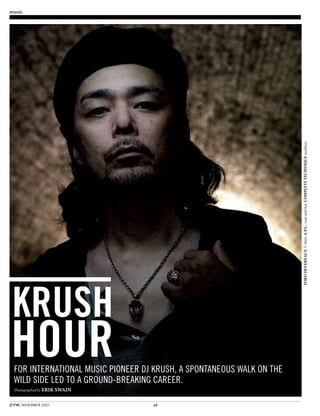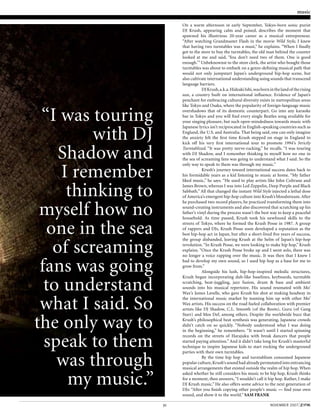DJKrush
- 1. 48november 2007 music For international music pioneer DJ Krush, a spontaneous walk on the wild side led to a ground-breaking career. Photographed by ERIK SWAIN Krush Hour YOKODEVEREAUXT-shirt.A.P.C.coatandhat.COMPLETETECHNIQUEnecklace.
- 2. november 200749 music ^After you finish copying other people¨s music ! find your own sound, and show it to the world. ̄ ROGANjacket.A.P.C.T-shirt.STUSSYpants.A.P.C.hat.CHRISTIAN ROTHsunglasses.ROLEXwatch.DJKrush¨sownringsandbelt. ADIDASleatherjacket.GAPT-shirt.STUSSYpants.A.P.C.hat. CHRISTIANROTHsunglasses.DJKrush¨sownringsandbelt.
- 3. 50november 2007 music NOM DE GUERRE coat. Vintage T-shirt available at Screaming Mimi¨s, NYC. STUSSY pants. ADIDAS sneakers. A.P.C. hat. Vintage BOTTEGA VENETA bracelet available at Local Clothing, NYC. DJ Krush¨s own rings and necklace. Stylist: HISSA IGARASHI. Photographer¨s assistants: JUSTIN TELLIAN and KALINA SKRILL. Stylist¨s assistant: ANN BINLOT.
- 4. november 200751 music On a warm afternoon in early September, Tokyo-born sonic purist DJ Krush, appearing calm and poised, describes the moment that spawned his illustrious 20-year career as a musical entrepreneur. ^After watching Grandmaster Flash in the movie Wild Style, I knew that having two turntables was a must, ̄ he explains. ^When I finally got to the store to buy the turntables, the old man behind the counter looked at me and said, `You don¨t need two of them. One is good enough.¨ ̄ Unbeknownst to the store clerk, the artist who bought those turntables was about to embark on a genre-defining musical path that would not only jumpstart Japan¨s underground hip-hop scene, but also cultivate international understanding using sounds that transcend language barriers. DJKrush,a.k.a.HideakiIshi,wasborninthelandof therising sun, a country built on international influence. Evidence of Japan¨s penchant for embracing cultural diversity exists in metropolitan areas like Tokyo and Osaka, where the popularity of foreign-language music overshadows that of its domestic counterpart. Go into any karaoke bar in Tokyo and you will find every single Beatles song available for your singing pleasure, but such open-mindedness towards music with Japanese lyrics isn¨t reciprocated in English-speaking countries such as England, the U.S. and Australia. That being said, one can only imagine the anxiety felt the first time Krush stepped on stage in England to kick off his very first international tour to promote 1994¨s Strictly Turntablized. ^It was pretty nerve-racking, ̄ he recalls. ^I was touring with DJ Shadow, and I remember thinking to myself how no one in the sea of screaming fans was going to understand what I said. So the only way to speak to them was through my music. ̄ Krush¨s journey toward international success dates back to his formidable years as a kid listening to music at home. ^My father liked music, ̄ he says. ^He used to play artists like John Coltrane and James Brown, whereas I was into Led Zeppelin, Deep Purple and Black Sabbath. ̄ All that changed the instant Wild Style injected a lethal dose of America¨s emergent hip-hop culture into Krush¨s bloodstream.After he purchased two record players, he practiced transforming them into sound-creating instruments and also discovered that scratching up his father¨s vinyl during the process wasn¨t the best way to keep a peaceful household. As time passed, Krush took his newfound skills to the streets of Tokyo, where he formed the Krush Posse in 1987. A group of rappers and DJs, Krush Posse soon developed a reputation as the best hip-hop act in Japan, but after a short-lived five years of success, the group disbanded, leaving Krush at the helm of Japan¨s hip-hop revolution. ^In Krush Posse, we were looking to make hip hop, ̄ Krush explains. ^Once the Krush Posse broke up and I went solo, there was no longer a voice rapping over the music. It was then that I knew I had to develop my own sound, so I used hip hop as a base for me to grow from. ̄ Alongside his lush, hip-hop-inspired melodic structures, Krush began incorporating dub-like baselines, keyboards, turntable scratching, beat-juggling, jazz fusion, drum & bass and ambient sounds into his musical repertoire. His sound resonated with Mo¨ Wax¨s James Lavelle, who gave Krush his shot at making headway in the international music market by teaming him up with other Mo¨ Wax artists. His success on the road fueled collaboration with premier artists like DJ Shadow, C.L. Smooth (of the Roots), Guru (of Gang Starr) and Mos Def, among others. Despite the worldwide buzz that Krush¨s philosophical beat synthesis was generating, Japanese crowds didn¨t catch on so quickly. ^Nobody understood what I was doing in the beginning, ̄ he remembers. ^It wasn¨t until I started spinning records on the streets of Harajuku with break dancers that people started paying attention. ̄ And it didn¨t take long for Krush¨s masterful technique to inspire Japanese kids to start rocking the underground parties with their own turntables. By the time hip hop and turntablism consumed Japanese popular culture,Krush¨s sound had already permutated into entrancing musical arrangements that existed outside the realm of hip hop. When asked whether he still considers his music to be hip hop, Krush thinks for a moment, then answers,^I wouldn¨t call it hip hop. Rather, I make DJ Krush music. ̄ He also offers some advice to the next generation of DJs: ^After you finish copying other people¨s music ! find your own sound, and show it to the world. ̄ Sam Frank ^I was touring with DJ Shadow and I remember thinking to myself how no one in the sea of screaming fans was going to understand what I said. So the only way to speak to them was through my music. ̄




